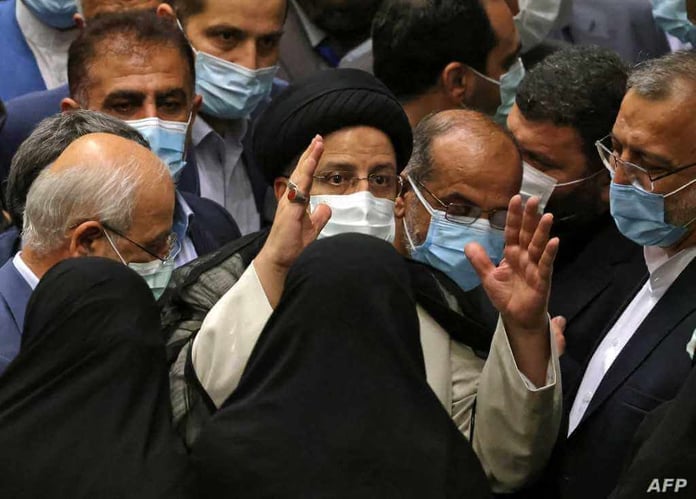
Ebrahim Raisi was sworn in to become the new president of Iran, Thursday, after a low turnout election that was organized to prevent any credible opponent, especially if he is a moderate, from running for it.
According to the New York Times , all eyes are on Raisi as the man who was chosen by the Iranian leader, Ayatollah Ali Khamenei, to succeed him as the country’s supreme leader, and that he will work to strengthen the control of hardliners in the Iranian regime.
The newspaper pointed out that there are a number of escalating challenges for Raisi, including a series of naval clashes with Israel, and other regional tensions in which Iran plays a role.
A faltering nuclear deal
A major inauguration comes amid stalled talks over the 2015 nuclear deal, a sagging economy made worse by sanctions, as well as the emerging coronavirus crisis.
The effects of the nuclear agreement have been canceled since former US President Donald Trump decided to unilaterally withdraw his country from it in 2018, and reimpose severe sanctions on Tehran, which worsened the situation in the country.
Iran’s regional role
The newspaper pointed out that Iran’s support for extremist groups in the Middle East, and its support for the Syrian government, constituted a point of contention with the countries of the region and Western powers.
The newspaper said Raisi nevertheless spoke defiantly, praising Iran’s regional policies as a “force of stability” in the region.
However, Raisi stressed that he would support “any diplomatic plans” that lead to the lifting of US sanctions, but stressed that the policy of pressure and sanctions would not push Iran to retreat from its “rights”.
“The embargo (sanctions) against the Iranian nation must be lifted. We will support any diplomatic plans that may help achieve this goal,” Raisi said in a speech in the parliament’s main hall.
Raisi reiterated the priority of neighboring countries in his foreign policy, saying, “I extend a hand of friendship and brotherhood to all countries in the region, especially our neighbors.”
Summary executions
Raisi was head of the judiciary in his country, and participated in a campaign of executions that targeted 5,000 political opponents, and was described as one of the “most heinous crimes in the modern history of Iran.”
In June, Human Rights Watch denounced Raisi’s election victory, saying it “raises real human rights and accountability concerns in the country.”
The human rights organization noted that Raisi “was a member of a four-member committee that ordered the execution of thousands of political prisoners in 1988.”
According to the deputy director of the Middle East department at the organization, Michael Page, “Iranian authorities paved the way for Ibrahim Raisi to become president with repression and unfair elections.”
“Raeesi, from his position at the head of the repressive judiciary, has supervised some of the most heinous crimes in Iran’s modern history, crimes that deserve investigation and accountability instead of being elected to a high position,” he added.
Escalating crises
It has become imperative for Raisi to deal with escalating crises caused by the targeting of the Mercer Street oil tanker, operated by Israel, by a drone, about a week ago, which led to the killing of two of its crew, and Iran was accused of being behind the matter despite its denials.
Iran was also accused of carrying out an attempted hijacking of another oil tanker, the “Asphalt Princess”, while it was crossing the Sea of Oman, days ago, which Iran also denied.
Popular protests
The inauguration of the president of the country came after a period not exceeding weeks of protests that swept all the cities of Khuzestan Province, against the background of water scarcity in the region.
The protests resulted in the killing of a number of demonstrators in addition to a security man, and they were violently repressed.
A number of protesters demanded the overthrow of the Iranian regime and the removal of its senior leaders from power.











